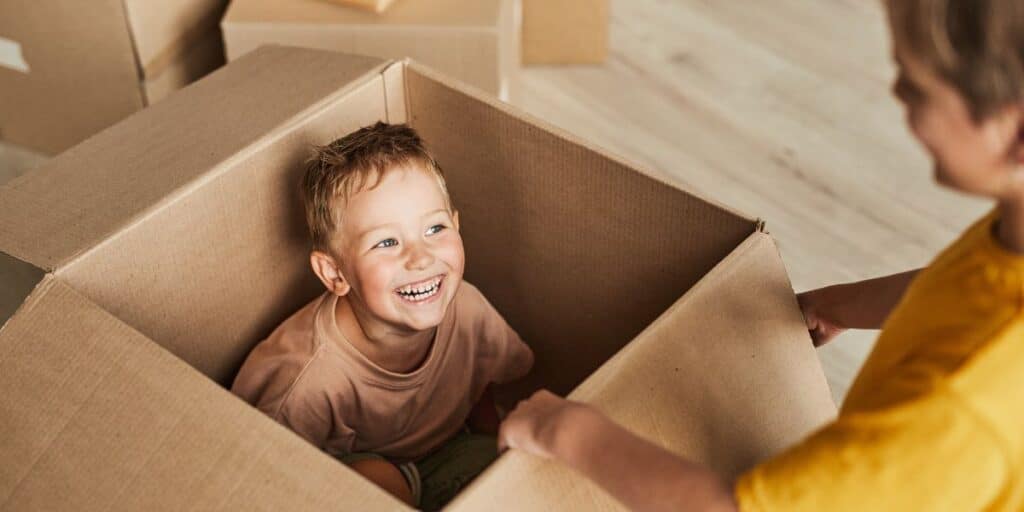Moving with children can be one of life’s most significant events, and it becomes even more complex when dealing with their emotions and needs. As a parent, you want to make the transition as smooth as possible while keeping stress levels low for everyone. At Abe Lincoln Movers and Storage, we’ve been helping families relocate for over 20 years. Through our experience, we’ve picked up a few tried-and-true strategies to make moving a positive adventure rather than a daunting task.
We’ve compiled our guide to make moving with children easier and ensure they feel secure and excited about the journey ahead. Keep reading to learn how to make the transition stress-free, and if you need help from a trusted Denver moving company, reach out for a quote!

Talk Openly About the Move: Set the Stage for a Smooth Transition
Children often feel uneasy about change, especially when it involves moving away from everything they know. Open communication is vital in helping them understand what’s happening and why. Explaining the reason for moving with children in simple, age-appropriate terms will help alleviate their anxiety and give them a sense of security.
Explain What, Why, and When
Start by explaining the basics: why your family is moving, where you’re headed, and when it will happen. This helps your children mentally prepare for the upcoming changes. For younger children, it may be helpful to use storybooks or visual aids to illustrate the concept of moving. More detailed discussions, including the exciting opportunities ahead, will help older kids feel more involved.
Answer Their Questions
Children will naturally have many questions, ranging from “Will I still see my friends?” to “What about my room?” Be patient and answer these questions honestly. If you can’t provide all the answers yet, let them know you’re working on them and will keep them updated. This reinforces their sense of security, knowing you’re in it together.
Visit the New Neighborhood
Take a family trip to the new neighborhood before the move. Show your children the local park, the new school, and other places they can look forward to exploring. If visiting isn’t an option, use Google Maps or photos of the area to help them visualize their future home. Seeing their new surroundings, even digitally, can help make the unknown more familiar and less intimidating.
Create Excitement About Their New Room
Let your children have input on your new rooms to get them involved in the decision-making process. Do they want to pick a color scheme or add some new decorations? Giving them control over their space will help them look forward to the move.
Maintain Familiar Routines: Keep Consistency in Chaos
Stability is crucial for children, particularly during periods of change. Maintaining your family’s regular routines as much as possible will help create a sense of normalcy amidst the chaos of moving with children. Children thrive on consistency, it helps them feel safe when everything changes.
Stick to Meal and Bedtime Routines
Whether it’s your nightly bedtime story, Saturday morning pancakes, or regular family movie nights, keep these routines intact as much as possible. This consistency provides comfort and signals to your children that while their environment changes, the family dynamic and the love they receive from you remain constant.
Unpack Their Favorite Things First
Once you’ve arrived at your new home, prioritize unpacking the items that will help your children feel most comfortable—favorite toys, books, and blankets. Setting up their rooms and establishing familiar spaces early on will help ease their transition and make the new house feel like home sooner.
Plan a Few Days of Familiar Activities
The initial days after a move can be overwhelming. Plan some activities that your children are used to—such as going to the playground, reading their favorite books, or eating familiar foods. Getting everything done right away is tempting, but taking breaks for familiar, comforting activities will help them adjust.

Make Packing and Unpacking Fun: Get Creative
Packing and unpacking are the most labor-intensive parts of any move, but involving your children when moving with them can turn these tasks into something fun rather than a dreaded chore. Children often feel anxious during a move because they sense a lack of control—giving them a role in the process can empower them and make them feel included.
Gamify the Packing Process
You can turn packing into a game! Set a timer and see who can pack the most items within a set time frame, or make a scavenger hunt where they have to find specific items and pack them. This helps alleviate boredom and makes packing an activity they look forward to rather than resist.
Create Special “Moving Day Kits”
Another way to keep your kids engaged is to give them a “moving day kit” filled with items they can pack themselves—favorite snacks, a small toy, or a coloring book. This keeps them occupied while giving them something familiar to hold onto during the transition.
Label Boxes Creatively
Let your children help label the moving boxes with their belongings. You could use colored markers or stickers to personalize their boxes. This will keep them entertained and help make the unpacking process easier, as they will be able to recognize which boxes belong to them.
Make Unpacking a Fun Discovery
Once you’ve arrived at your new home, turn unpacking into a fun adventure. Encourage your children to unpack their favorite items and put them in their new room. Allowing them to set up their space makes them feel more at home and helps them take pride in their new environment.

Stay Calm and Positive! Your Energy is Contagious
Moving is stressful for everyone, adults and children alike. However, your attitude as a parent can significantly influence how your children perceive and handle the move. Kids are incredibly perceptive and tend to mirror the emotions of their parents. If you’re visibly anxious, your children will likely feel the same. Maintaining a calm and positive demeanor, even when things don’t go perfectly, will help your kids feel reassured.
Take Care of Yourself Too
Taking care of your own needs is crucial during a move. Ensure you’re eating well, sleeping when possible, and asking for help if needed. When you care for yourself, you’re in a better place to be emotionally for your children. If you’re feeling overwhelmed, consider delegating some tasks to a professional moving company, like Abe Lincoln Movers, so you can focus more on your family.
Reframe Challenges as Adventures
If something unexpected happens, such as a delay in moving in or missing items, try reframing it positively. Use language encouraging resilience, such as, “Looks like we’re having an adventure tonight!” This perspective will help your children view challenges as part of the process rather than something negative.
Celebrate Milestones
Celebrate small moving milestones with your family. After a long day of packing, take a break for a pizza night or watch a family movie. Once you’re unpacked, plan a family outing to explore a fun spot in the new neighborhood. These small moments of celebration make the moving process feel like an adventure and remind your children that moving can be hard work but also an opportunity for new experiences and fun.

Let Us Help Make Your Move Easier
Moving is a big deal, especially when you have little ones involved. At Abe Lincoln Movers and Storage, we aim to take some of the weight off your shoulders so you can focus on what matters most—your family. With over 20 years of experience, we know how to make the process seamless and stress-free.
If you’re planning a move, contact us today for a fast, free quote. Let’s make this next chapter exciting for you and your family.
Call Abe Lincoln Movers and Storage—We’re Ready to Help!
